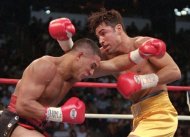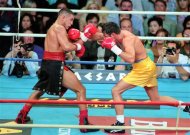Detained in Cameroon's hospitals

Estelle
Koulman has recently celebrated her first birthday - and her first
taste of freedom as she spent the first 11 months of her life imprisoned
- in a Cameroonian hospital.
Shortly after she was born in a ward in Ngousso, on the
outskirts of Cameroon's capital, Yaounde, she was operated on for a
bowel problem.The little girl made a quick recovery, but she and her mother Germaine Abeboulouguiye were unable to return home as the bill came to $600 (about £375).
The government hospital refused to release them until the medical fee was settled.
 Germaine Abeboulouguiye and her baby were recently freed after a paper highlighted their plight
Germaine Abeboulouguiye and her baby were recently freed after a paper highlighted their plight
"There is a lot of stress and complications - the atmosphere is not good to help raise a baby," Ms Abeboulouguiye told the BBC during her detention.
Ms Abeboulouguiye's mother came to visit at the time - bringing food and other essentials, but otherwise they were prevented from leaving the hospital.
When Cameroon's Le Jour newspaper reported their case, it caused outrage in Cameroon and a local charity intervened and paid part of the bill.
The authorities, embarrassed by the furore, waived the rest of the fee and mother and baby were finally allowed home after 11 months of detention in a white-walled hospital ward.
They are the most extreme case of the government's policy to get patients to help fund healthcare.
It makes up about 70% of the hospital budgets - and patients are expected to cover the rest.
Some free services are carried out, like malaria diagnosis for children under five.
Mary Akwa Patient in Buea Regional HospitalIf my family members can't help, where else should I turn to?”
But now it is common for patients who
cannot pay their bills for other treatments to be detained until their
relatives pay up some or all of the debt.
It was not a government policy that was ever announced, but it has come in gradually over the last five years.Three weeks after Mary Akwa was admitted to Buea Regional Hospital for a stomach problem she was unable to find money for her bill.
"If my family members can't help, where else should I turn to?" she asked, clearly distressed.
The health authorities in Cameroon declined to comment on the allegations.
A doctor at Hospital Laquintinie in the commercial capital Douala, says the government policy brings with it difficult choices - and sometimes treatment is withheld.
"If patients don't pay me, I can't treat them," he told the BBC, requesting anonymity.
However, Dr George Enow Orock, director of Buea Regional Hospital, says while some patients may be "held back" to pay their bills they are never denied assistance.
"[We will] do something to cater for somebody dangling between life and death," he said.
"It is our obligation to care for citizens."
 Traditional doctors accept produce and animals as payment for their services
Traditional doctors accept produce and animals as payment for their services
Private and public security guards have been drafted in - usually on duty at the gates to ensure no patient escapes without paying their bill.
'Escaped'
Former patient at a Catholic hospitalI worked for six long months to pay off that bill. Cleaning, washing plates, gardening - any odd job that cropped up”
"We check patients before they
leave the hospital premises if they have paid all the necessary dues. We
check the various receipts and ensure that they are authentic," says
Samuel Njie, a guard at Buea Regional Hospital.
"We've had cases of patients who have escaped from the hospital without our knowledge."Some religious or mission hospitals and private clinics, which receive a small government subsidy, operate a similar policy in order to cover their costs.
But instead of expecting patients to pay, some ask them to work in lieu of their bill.
A tall man in Yaounde, who asked to remain anonymous, told me he was detained until July in a mission hospital in the north-west of Cameroon for six months.
He said he had contracted typhoid fever and gone to a Catholic hospital for treatment.
After the little money he had on him ran out, he was told he would have to work off the rest of his medical fees.
 Patients are urged not to make corrupt payments
Patients are urged not to make corrupt payments
"Cleaning, washing plates, gardening - any odd job that cropped up.
"There was nothing I could do about it."
With the average Cameroonian surviving on less than $1 a day, some people prefer visiting traditional doctors when they get sick.
When a patient cannot pay for their treatment in cash, traditional practitioners allow them to pay in kind.
One traditional doctor in Buea told me the most popular items people use to pay their bills are fowls, goats and other things easily available in rural areas.
It is an option Germaine's mother, Mrs Abeboulouguiye, wished she could have used to settle her daughter and granddaughter's bill.
"For the first time in my life I could not help my daughter. They kept asking me to bring money to pay - even when I said I had no money."

